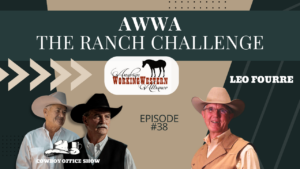
Ep 38: AWWA & The Ranch Challenge
Episode 38
The AWWA and The Ranch Challenge.
Leo Fourre, judge, BOD & professional shares the insights on The Ranch Challenge and the new development of the WWA ( Working Western Alliance).
You don’t often get to interview someone who has touched so many facets of the horse industry in her career and knows the evolving ins and outs of the horse show business. Marnye Langer is the general manager of Hansen Dam Horse Park, CEO of the Langer Group, USEF “R” judge, author and award winning writer. She’s also an accomplished hunter/jumper rider who is taking a walk on the wild side as she explores reining and ranch classes. Her experience and passion for the horse industry are evident in her life and work.
Will this fifth generation Californian who’s known for her hunter/jumper skills clash with a couple of cowboys? Find out in Episode 18, where we cover topics from social license to operate and how that affects equine activity in Marnye’s home state of California, to the current state of the horse show business and how economics and long standing practices are continuing to shift, to removing labels that cause division thereby encouraging unity in the horse industry.
In This Episode
As general manager of Hansen Dam Horse Park, Marnye oversees operations of a facility that not only provides a venue for horse shows but is able to house over 200 horses and currently provides for 18 trainers who work out of the facility. The concept of one venue providing training facilities for multiple trainers is not common across the country, but it enables trainers to focus on their core competencies and business while the facility handles maintenance and other support services.
One of those services is keeping trainers updated and aware of industry changes that could impact their future. Social license to operate is a good example. With increased urbanization much of the country has lost touch with their agricultural roots and trainers must be aware of how their daily interactions with horses can impact how the public views the horse industry as a whole. This often overlooked subject has the potential to affect the future, not only of their individual business, but of the facility and even the industry in general.
Finding Balance
The cowboys and Marnye tackle tough questions like how does the industry find balance between regulations and oversight while maintaining flexibility and innovation? What works in the boardroom does not always translate in the trenches of training, showing, and caring for our horses on a daily basis.
Add to that the concerns over the environment and it’s easy to see how facilities and trainers get caught in the middle as they attempt to be successful in the business of the horse business. The current trajectory of the industry has the potential to create an elitist only environment where only the affluent are willing and able to pay the price of showing.
What happens to the middle guy and newcomers when the cost of competing pushes them out of the game? They find another game to play. And what happens to the top when the bottom crumbles? Well, it’s a pretty obvious answer.
What isn’t obvious is how to fix the problems we see. Business is business and without a profit shows can’t continue. Exhibitors without show production experience may walk away thinking show management is raking in all that dough, but often, especially at the middle and smaller shows, management is barely in the black after paying expenses. The profit margin is slim after paying staff and facility fees, not to mention prizes or added money to entice exhibitors to attend. The industry desperately needs to discover how to create wealth within its ranks rather than causing all levels to expend wealth until they leave.
While we can’t fix all our problems, there is one thing we can each do to improve our industry. Stop labeling yourself and others and get unified behind the love of the horse. No matter your discipline, age, or level of experience, get out of your “tribe” and remove the divisiveness that keeps us struggling to find a unified voice that speaks for all areas of the horse industry.
ONE MORE THING
Take the American Horse Council Economic Impact Survey. Your voice matters so use it!
Website: CowboyOffice.com
Facebook: @cowboyofficeshow
Instagram: @cowboyofficeshow
LinkedIn: cowboy-office>
TikTok:@cowboyofficeshow
Email: Exec@CowboyOffice.com
Langer Group: https://langer.group/
Hansen Dam Horse Park: https://hansendamhorsepark.com/
American Horse Council Economic Impact Survey: https://horsecouncil.org/economic-impact-study/
Production and marketing by ConsultMent.Agency

Episode 38
The AWWA and The Ranch Challenge.
Leo Fourre, judge, BOD & professional shares the insights on The Ranch Challenge and the new development of the WWA ( Working Western Alliance).
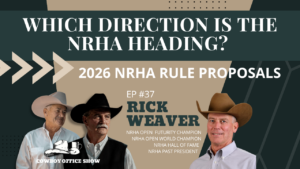
Episode 37
The NRHA has 40 rule proposals on the table for 2026. We review and discuss each rule and explore the effects for the sport and association.
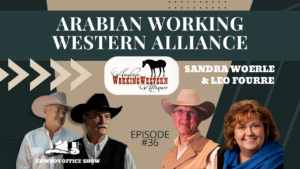
Episode 36 The Arabian Working Western Alliance. AWWA.
The newest challenge to the working western horse in a competitive arena. Amateurs are the highlight as well as the skills of a western horse put together in a challenging format that is more than Ranch Riding.
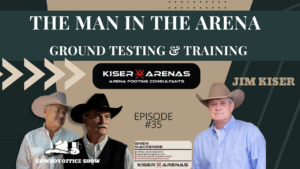
Episode 35 Jim Kiser from Kiser Arenas.
The Man in the Arena. He is riding forward as he shares how to measure, test and manage our performance ground to keep horses sound, performing higher and producing our events better. Join us for a great discussion.
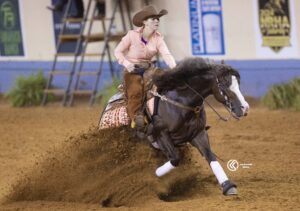
2024 Open Reining Champion. Kaci O”Rourke and The Fireman make history as the 1st woman to win this prestigious event.
We review the event and provide data and analytics for the officiating performance relative to the professional talent displayed.
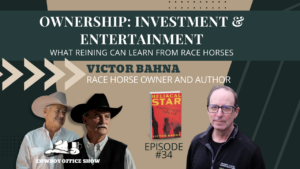
Episode 34 has an epic discussion around the common issues and scenarios in the industry. Race horses or high performance horses, change the names, venues and towns as the story may be very similar. From medications performance enhancing drugs, government regulations and the bond between horse and human along with what competition will do to human behavior. Join us for a great conversation.
Reining Licensed officials stats and measurable data:
Copyright 2022 -2025• 4D Productions LLC • Privacy | Terms | Accessibility | Sitemap • Made with by ConsultMent